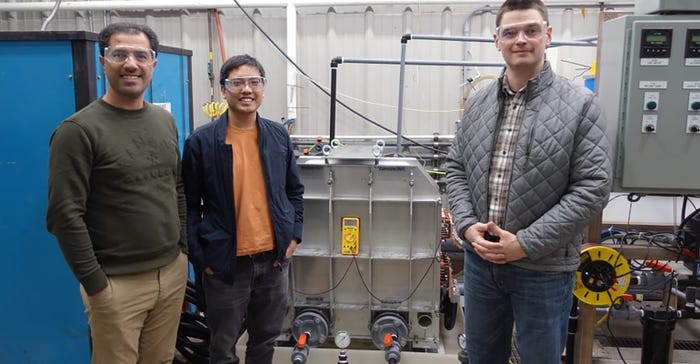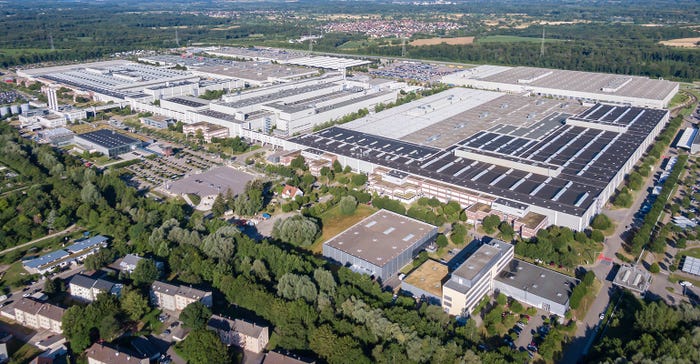Flow Batteries: The Lynchpin of Renewable Energy Storage
Quino Energy and Mercedes-Benz's collaboration with CMBlu Energy are transforming renewable energy storage with flow batteries.

Within the renewable energy landscape, flow batteries stand out as a promising solution for storing electricity on a large scale. Unlike traditional batteries, which store energy in solid electrodes, flow batteries utilize liquid electrolytes stored in external tanks. This distinctive design allows for independent scaling of energy storage capacity and power output, making flow batteries highly adaptable for grid-scale applications where flexibility and scalability are essential.
While lithium-ion batteries have primarily served short-duration grid storage up to four hours in duration, flow batteries have the potential to emerge as an alternative well-suited to longer durations, between 4-40 hours. In the quest for sustainable energy storage innovations, Quino Energy's achievement of Manufacturing Readiness Level 7 (MRL 7) for its zero-waste production line and Mercedes-Benz's collaboration with CMBlu Energy for an 11MWh SolidFlow battery deployment showcase ongoing efforts to find alternatives to lithium-ion batteries. These advancements in flow batteries underscore a collective commitment to a greener, more resilient energy future.
Quino Energy: Pioneering zero-waste production
Quino Energy's recent achievement in reaching MRL 7 for its organic flow battery active material pilot production line represents a significant milestone in the journey toward sustainable energy solutions. By adopting a zero-waste production process, the company has demonstrated the feasibility of mass-producing high-performance battery materials while minimizing environmental impact. The company believes that this breakthrough not only reduces reliance on rare and costly materials like vanadium but also positions organic flow batteries as a cost-competitive alternative to conventional energy storage solutions.

From left: Meisam Bahari, Ph.D., Co-Founder and CTO; Eugene Beh, Ph.D., Co-founder and CEO; Nathan Ball, EVP of Business Development. Courtesy of Quino Energy.
Eugene Beh, co-founder and CEO of Quino Energy, stated, “With this pilot production line, we will be able to produce flow battery reactants that are immediately cost-competitive with vanadium. Ultimately, Quino Energy’s technology will enable organic flow battery systems to reach half the cost of lithium-ion batteries.”
Mercedes-Benz embraces CMBlu Energy's sustainable solution
The collaboration between Mercedes-Benz Group AG and CMBlu Energy further emphasizes the growing adoption of flow batteries across industries. Mercedes-Benz's decision to invest in an 11MWh CMBlu Energy SolidFlow battery for its Rastatt plant in Germany exemplifies the automotive giant's commitment to sustainable energy practices. The battery stationed in Rastatt will be able to store and discharge around 11 MWh of renewable electricity sourced from the plant's photovoltaic systems over an extended duration. This equates to the energy required for over 150 fully electric EQA models manufactured at the Rastatt plant.
The deployment of CMBlu's Organic SolidFlow technology signifies a shift towards decentralized energy storage solutions that enhance reliability and resilience amidst increasing renewable energy integration. According to CMBlu Energy, its SolidFlow battery utilizes organic technology, boasting fully recyclable organic materials that are readily available worldwide. Unlike traditional batteries reliant on metal ions, the organic SolidFlow battery employs carbon-based molecules for its electrolytes. Similar to Quino Energy's approach, this solution also eliminates the need for rare or critical raw materials, reducing supply chain dependencies and environmental impact.

Mercedes-Benz plant in Rastatt (Germany). Courtesy of Mercedez-Benz.
“Our SolidFlow battery storage systems are ideal for buffering and therefore integrating the increasing amounts of renewable energy into European power grids. CMBlu’s innovative battery designs rely on natural and practically infinitely available resources, which avoids the need for new dependencies on raw materials – unlike with more common metal-based batteries. We look forward to additional growth and demand for CMBlu’s innovative battery technology over the next year, including expansion of our company’s operations in North America.” Stated Dr. Peter Geigle, founder and retiring CEO of CMBlu Energy.
A sustainable path for energy storage
The Flow Battery Market is expected to reach USD 0.88 billion in 2024 and grow at a CAGR of 15.41% to reach USD 1.79 billion by 2029. The union of technological innovation and market demand will drive the widespread adoption of flow batteries worldwide.
Flow battery technology promises to unlock new opportunities for renewable energy integration and grid stability, paving the way for a sustainable and prosperous future. With their ability to offer long-duration storage, rapid response times, and enhanced safety features, flow batteries are poised to play a pivotal role in the transition to a renewable energy future.
About the Author(s)
You May Also Like





